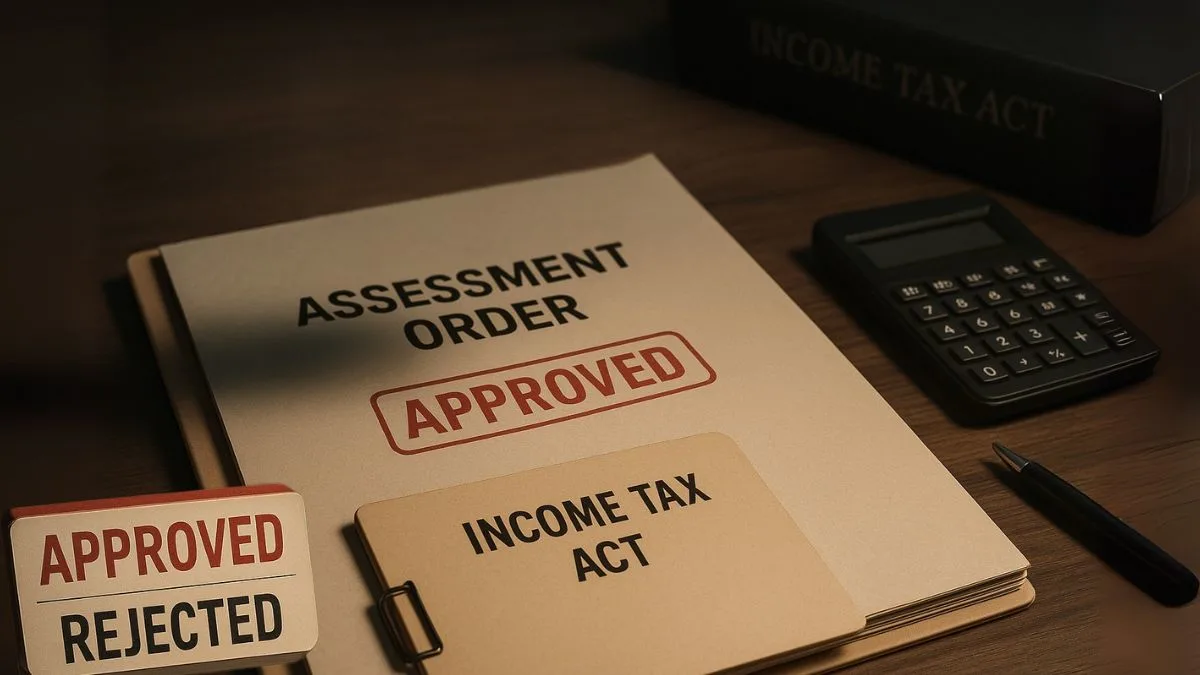
Every taxpayer in India must file their income tax return accurately and on time. However, the process doesn’t end with filing. The Income Tax Department verifies returns and issues an Assessment Order, which finalizes the taxable income and tax liability of the taxpayer.
An Assessment Order ensures compliance with tax laws by verifying the accuracy of declared income, determining exact tax liabilities or refunds, and acting as a record for future references or disputes. This makes it a crucial part of the taxation process, ensuring fairness and accountability for both taxpayers and the government.
What is an Assessment Order?
An Assessment Order is an official determination of the taxpayer’s income, deductions, tax liability, and refunds for a particular financial year. It is issued by the Assessing Officer after examining the income tax return filed by the taxpayer, along with supporting documents, information, or clarifications submitted during the scrutiny process.
Simply put, it is the government’s confirmation of what your final taxable income is & how much tax you are liable to pay—or how much refund you are entitled to receive."
Why Assessment Orders are Important
The significance of an Assessment Order lies in its functions:
- It ensures compliance with tax laws by verifying the accuracy of declared income.
- It helps in determining exact tax liabilities or refunds after considering deductions, exemptions, and adjustments.
- It serves as an official record for future references or disputes with the tax department.
For taxpayers, the order provides closure for the financial year & reduces uncertainty about tax liabilities.
Process: Collecting Data and Verifying Returns
Issuing an assessment order is not a random act. The process begins with collecting data—the Assessing Officer reviews the income tax return, Form 16/16A, Form 26AS, and Annual Information Statement (AIS).
The officer may also seek clarifications, issue notices, or request additional documents. The idea is to cross-check whether the income, deductions, and exemptions claimed are accurate. Based on this data, the order is drafted and finalized.
Also Read: The Taxman’s Final Word That Can Change Your Finances Overnight
How It’s Issued
Once the examination is complete, the Assessing Officer prepares and issues the Assessment Order. The order clearly states:
- The total income determined.
- The final tax liability or refund.
- Any adjustments made to the return filed.
- Interest or penalties, if applicable.
Taxpayers receive this order electronically on the income tax portal. This is an important step because it provides legal backing to the department’s determination of income & taxes.
One Order Per Assessment Period
The law clearly specifies that only one order of assessment shall be made for the specified period or part thereof. This means that for each financial year (assessment year), the department cannot repeatedly pass multiple orders for the same set of income.
This principle ensures certainty and avoids unnecessary harassment of taxpayers. It also gives taxpayers the confidence that once an assessment is completed & finalized, it cannot be reopened without strong legal grounds.
Types of Assessments
While the end result is the Assessment Order, there are different types of assessments under the Income Tax Act:
- Summary Assessment (Section 143(1)) – Automated processing of returns.
- Scrutiny Assessment (Section 143(3)) – Detailed verification by the officer.
- Best Judgment Assessment (Section 144) – When the taxpayer fails to comply with notices.
- Reassessment (Section 147) – If income has escaped assessment.
Each type has its own importance, but the final outcome in every case is an assessment order.
Legal Validity of Assessment Orders
An assessment order is not just a piece of paper—it has full legal validity. If a taxpayer disputes the order, it can be challenged before the Commissioner of Income Tax (Appeals), the Income Tax Appellate Tribunal (ITAT), or even higher courts.
Because of this, assessment orders are carefully drafted, ensuring that they align with provisions of the Income Tax Act & relevant case laws."
Role in Future References and Disputes
Another key aspect is that an Assessment Order acts as a record for future references or disputes. If a taxpayer’s case is reviewed in the future, the order serves as evidence of the tax department’s determination for that year.
This is why taxpayers are advised to keep their assessment orders safe, as they might be needed for loan applications, visa processes, or future audits.
Example of an Assessment Order Scenario
Let’s say Ms. Kapoor files her ITR showing an annual income of ₹15 lakh with deductions under Section 80C and 80D. During scrutiny, the officer finds that one deduction claim is not supported with documents.
The Assessment Order adjusts her taxable income to ₹15.5 lakh, adds the extra tax liability, and includes interest on delayed payment. This shows how the order becomes the final word on taxable income for that year, unless appealed.
Also Read: The ₹1.5 Lakh Tax-Saving Secret Most Taxpayers Miss!
Importance for Tax Planning
Assessment orders also indirectly highlight the need for better tax planning. By maintaining proper records, claiming only valid deductions, and filing accurate returns, taxpayers can avoid unnecessary disputes.
Since the order is binding unless appealed, being proactive in compliance ensures smooth assessments & timely refunds."
Final Thoughts
The Assessment Order is the backbone of the Indian taxation system. It ensures compliance with tax laws by verifying the accuracy of declared income, determining exact tax liabilities or refunds, and acting as a record for future references or disputes. The process involves collecting data, cross-checking returns, and then issuing the order.
Importantly, the principle that only one order of assessment shall be made for the specified period or part thereof provides taxpayers with certainty & transparency.
✅ Want to avoid disputes and ensure your assessment order is error-free? Visit Callmyca.com and let our experts help you with tax planning, filing, and compliance—so you never have to worry about unwanted surprises from the tax department.











